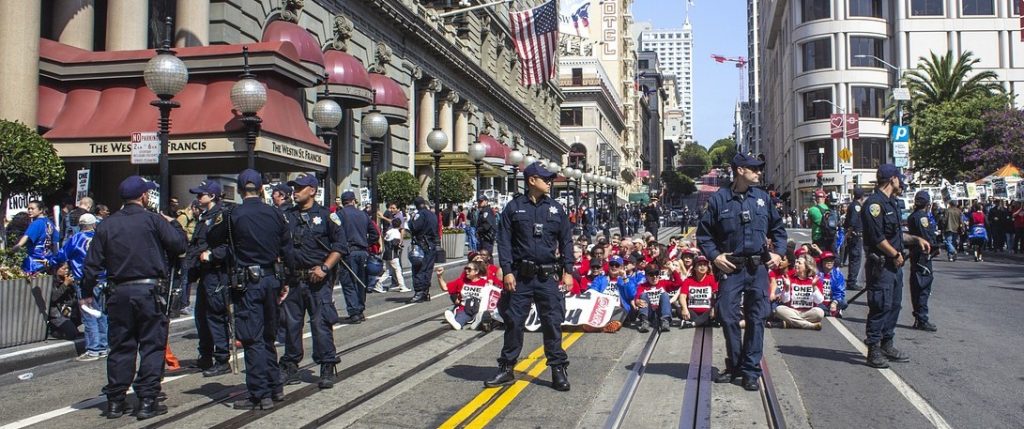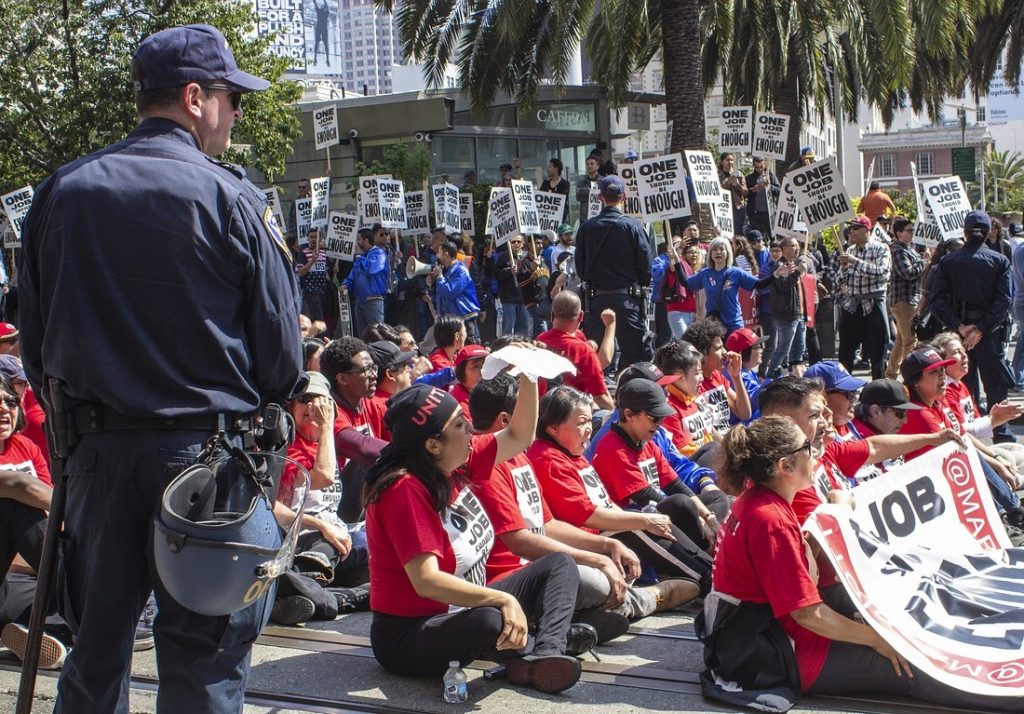Disturbing the Peace Misdemeanor
Disturbing the Peace is a misdemeanor in Michigan. Although not the crime of the century, it can still impact employment, civil liberties, freedom, and more.

Disturbing the Peace Explained
Disturbing the Peace or Disorderly Conduct can be charged independently or with other felony or misdemeanor cases. The possible factual situations resulting from this type of charge vary. Even though this charge may not be a theft offense or weapons charge, it is serious and can result in jail and probation for as long as two years with extensive terms, conditions, and financial obligations. A good criminal defense lawyer can often make the difference between a conviction and a dismissal.
The state law regarding disturbing the Peace is MCL 750.170 and says, “disturbance of lawful meetings—Any person who shall make or excite any disturbance or contention in any tavern, store or grocery, manufacturing establishment or any other business place or in any street, lane, alley, highway, public building, grounds or park, or at any election or other public meeting where citizens are peaceably and lawfully assembled, shall be guilty of a misdemeanor.”
General Information and Examples
Almost every community has a local ordinance that similarly defines disturbing the peace. It is unusual to be charged with Disturbing the Peace under state law; it is more common for local governments to bring these charges. The punishment is a misdemeanor conviction – which could mean jail, probation, fines and costs, drug and alcohol testing, and many other possible penalties. As you can see from the statute, it is simple for a police officer to charge a person with disturbing the Peace, even for conduct that is only minimally out of the ordinary. Examples could be playing your radio too loudly, not stopping a dog from parking in public, consuming too much alcohol in a public area, or arguing with someone on a public sidewalk.
Depending on the sensitivity of a police officer, seemingly innocuous behavior can result in a Disturbing the Peace change. Therefore, you must have the best criminal defense attorneys in Michigan represent you. You do not want to risk a criminal record because your dog barked too much or you played your radio too loudly. Those minor situations can result in someone being saddled with a criminal record, jail, and probation.

Defending Against Disturbing the Peace Charges
Defending against charges of disturbing the Peace involves several strategies and considerations that a criminal defense attorney may employ. Here are some key approaches:
- Challenge the Legal Basis of the Charge: The attorney might argue that the behavior does not meet the legal definition of “disturbing the peace.” This could involve demonstrating that the actions were not loud, unruly, or disruptive enough to qualify under the statute.
- Question the Evidence: Attorneys often scrutinize the evidence presented by the prosecution. This can include challenging the credibility of witnesses, the accuracy of police reports, or the legality of any evidence collection.
- Assert Constitutional Rights: The defense might argue that the defendant’s actions were protected under the First Amendment (freedom of speech and assembly). This is particularly relevant in cases involving protests or other expressive conduct.
- Highlight Contextual Factors: The context of the alleged disturbance can be crucial. For example, if the incident occurred in a typically noisy area, the attorney might argue that the defendant’s actions were not out of the ordinary.
- Negotiate a Plea Bargain: The attorney might negotiate a plea bargain if the evidence against the defendant is strong. This could involve pleading guilty to a lesser charge in exchange for a reduced sentence or other concessions.
- Present a Defense of Necessity or Duress: In some cases, the attorney might argue that the defendant’s actions were justified due to an emergency or were conducted under duress.
- Use Character Witnesses or Other Testimony: The attorney might bring in character witnesses to testify about the defendant’s usual behavior and character, suggesting that the alleged disturbance is out of character and, therefore, less likely.
- Employ Expert Testimony: In some cases, expert witnesses might be used to provide context or specialized knowledge, such as sound experts in cases where noise level is a key factor in Disturbing the Peace allegations.
- Seek Dismissal or Reduction of Charges: The attorney may argue for dismissal of the charges if there are procedural errors or insufficient evidence. Alternatively, they might seek to have the charges reduced to a lesser offense.
- Mitigation and Rehabilitation: If conviction seems likely, the defense strategy might shift towards demonstrating the defendant’s willingness to engage in community service, counseling, or other rehabilitative measures to mitigate sentencing.
Each case is unique, and a skilled defense attorney, such as the ones with LEWIS & DICKSTEIN, P.L.L.C., will tailor their strategy to the specifics of the case and the evidence available.

Probation for Disturbing the Peace
Most judges will not impose jail time for Disturbing the Peace unless the defendant has a criminal history or the facts of the case are particularly egregious. Conversely, judges will almost always order the defendant to be supervised by the court for months or years following the conviction. Court supervision is called “probation.”
The probation terms and conditions following a misdemeanor conviction for disturbing the Peace in Michigan can vary depending on the case’s specifics and the judge’s discretion. However, some of the more stringent or burdensome conditions that could be imposed include:
- Lengthy Probation Period: The probation period could be set at the maximum allowable duration for misdemeanors in Michigan, which is typically up to two years.
- Strict Reporting Requirements: The individual may be required to report frequently to a probation officer, which can be burdensome in terms of time and travel.
- Restrictive Curfews: A curfew could be imposed, limiting the individual’s freedom to be outside their home during certain hours.
- Community Service: A significant number of community service hours might be mandated.
- Mandatory Counseling or Educational Programs: If the circumstances of the Disturbing the Peace allegations are severe, the court could require attendance in anger management classes, substance abuse counseling, or other rehabilitative programs, depending on the circumstances of the case.
- No-Contact Orders: If the disturbance involved specific individuals, a no-contact order might be issued, prohibiting the individual from contacting those persons.
- Restrictions on Alcohol and Drug Use: The probation terms could include prohibitions on consuming alcohol or non-prescribed drugs, along with regular drug testing.
- Employment or Educational Requirements: The court might require maintaining steady employment or enrollment in educational programs.
- Fines and Restitution: In addition to any fines associated with the conviction, the individual might be required to pay restitution if the disturbance caused damage or harm.
- Travel Restrictions: The individual might be restricted from traveling outside a particular area without permission from the probation officer.
- Electronic Monitoring: In some cases, electronic monitoring or house arrest could be a condition of probation, especially if the court deems the individual a risk.
Violation of any of these probation terms can lead to severe consequences, including the possibility of serving jail time. It’s important to note that these are general guidelines, and the actual probation terms would depend on the case’s specific details and the court’s judgment.

The Premier Criminal Defense Attorneys in Michigan
The LEWIS & DICKSTEIN, P.L.L.C. law firm considers every criminal offense, including misdemeanor Disturbing the Peace, a significant offense and plans its defense accordingly. Our attorneys have spent their entire professional careers defending the constitutional rights of people charged with criminal offenses. They take their responsibility for protecting a criminal defendant from governmental abuses very seriously.
LEWIS & DICKSTEIN, P.L.L.C. offers a unique “team” approach. Most firms will assign you to one attorney, who either attempts to defend you alone or reassigns your case to a less-experienced associate. At LEWIS & DICKSTEIN, P.L.L.C., you have the benefit of the many years of experience of all our firm’s attorneys. Each of our attorneys is involved, participates in the representation, and has decades of experience and an unparalleled track record of success. Our clients benefit from the collective effort of our firm’s attorneys. We take great pride in our record of success and tenacious representation of our clients.
Call us today at (248) 263-6800 for a free consultation or complete an online Request for Assistance Form. We will contact you promptly and find a way to help you.














